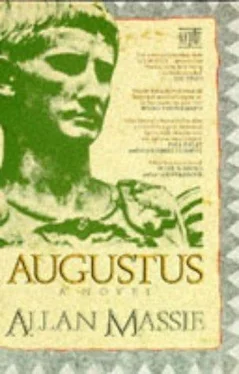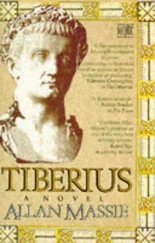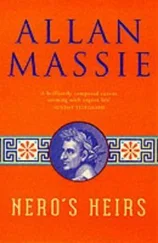Allan Massie - Augustus
Здесь есть возможность читать онлайн «Allan Massie - Augustus» весь текст электронной книги совершенно бесплатно (целиком полную версию без сокращений). В некоторых случаях можно слушать аудио, скачать через торрент в формате fb2 и присутствует краткое содержание. Жанр: Исторические приключения, на английском языке. Описание произведения, (предисловие) а так же отзывы посетителей доступны на портале библиотеки ЛибКат.
- Название:Augustus
- Автор:
- Жанр:
- Год:неизвестен
- ISBN:нет данных
- Рейтинг книги:4 / 5. Голосов: 1
-
Избранное:Добавить в избранное
- Отзывы:
-
Ваша оценка:
- 80
- 1
- 2
- 3
- 4
- 5
Augustus: краткое содержание, описание и аннотация
Предлагаем к чтению аннотацию, описание, краткое содержание или предисловие (зависит от того, что написал сам автор книги «Augustus»). Если вы не нашли необходимую информацию о книге — напишите в комментариях, мы постараемся отыскать её.
Augustus — читать онлайн бесплатно полную книгу (весь текст) целиком
Ниже представлен текст книги, разбитый по страницам. Система сохранения места последней прочитанной страницы, позволяет с удобством читать онлайн бесплатно книгу «Augustus», без необходимости каждый раз заново искать на чём Вы остановились. Поставьте закладку, и сможете в любой момент перейти на страницу, на которой закончили чтение.
Интервал:
Закладка:
'Let's say banker.' I kept a smile in my voice. 'Do you think my banking blood should be potent enough to persuade me to take the money and do nothing else? Do you think anyone would believe I was satisfied with that? What do you think my own soldiers would say?'
'Your own soldiers?' He sighed and poured himself wine. 'It's a fantasy, child, a boy's game, but it will end in blood, your blood, I fear. Well, your mother can't say I didn't try to dissuade you.'
It is hard to make you, my beloved boys, who have been brought up in peace and order, understand the mood of a crumbling state, of an incipient revolution. If I talk of fear and uncertainty, what can these be but words to you children of sunshine? In the same way, you know me as a man on the verge of old age; you can hardly remember your natural father Agrippa. You, Gaius, were only eight when he died; you, my dear Lucius, an infant of five. I myself could never imagine Julius young, and yet I saw him in dangerous action. And you have been brought up in the Republic which I restored; how can you imagine a world that was falling apart, where no man knew his friend?
I trusted Agrippa and Maecenas of course. Apart from affection, they had nowhere else to go. But I trusted no other man above the rank of centurion, and not always them either. Even Maco said to me, 'You know, sir, my brother's with Antony. I could get him to let us know the feeling in his camp…' I assented of course, but how could I be sure of the honesty of any answer? And it wasn't really true either that Agrippa and Maecenas were bound to me; traitors are always welcome, for a time at least. Yet I had to act as if their affection, of which I was sure, could continue to determine their interest; which was more doubtful.
There were at least five parties or factions in the State, including my own.
Antony had inherited part of Caesar's following. He was consul which assured him direct command of at least five legions, and, even more important, gave him legitimate authority.
The chief of the self-styled Liberators, Marcus Brutus and Gaius Cassius, still posing as true friends of the Republic, had withdrawn in panic from the city which had vociferously rejected their gift of blood. Though they had only been assigned in the previous elections the unimportant provinces of Crete and Cyrene respectively, within a few weeks it was known that Brutus had gone to Macedonia, Cassius to Syria, where they were raising rebellious armies in the name of Liberty and Republican virtue.
Lurking in Sicily was Sextus Pompey, unworthy son of an over-rated father. Pompey the Great had cleared the sea of pirates; Sextus was little better than a pirate himself. Yet he had attracted to him the most irreconcilable remnants of the old Optimate party, those who, unlike the Liberators, had never made their peace with Caesar.
In Rome itself you could find the constitutionalists; their chief was Cicero. He was at least a voice, a marvellous and fecund organ.
And then, myself. I had got the nucleus of an army. It burned to revenge Caesar, and would continue to burn as long as I could pay it. 'Money,' Maecenas said, 'money is how it is done.'
Agrippa snorted, but I knew Maecenas was right. To this extent anyway; without money it couldn't be done.
Mark Antony had grown. That was the first surprise. I have since seen other men contract in office, as if the possession of authority revealed their deficiencies to them. His manner too had changed. He had treated me before like a younger brother. I had disliked his assumption of intimacy; he had had a habit of putting his arm round my shoulders and hugging me towards him which I found particularly offensive. Now he lay back on a couch, with two greyhounds resting beside him, and, having dismissed the slaves, looked me straight in the face.
'You're making trouble,' he said. He spoke as if I was a defaulter, and didn't ask me to sit down. Nevertheless I took the other couch. (Perhaps he regretted not having had it removed.) In the silence the babble of the morning forum rose up to us.
'I grant you,' he said – and I felt I had won the first round by compelling him to make the running in the conversation – 'that you have secured the south. I even grant it was well done. But the stories you permit to be circulated can only serve our enemies.' 'Our enemies?'
'Yes,' he said. 'I want those soldiers you have. How many is it? A legion? Half a legion? You realize of course that as consul I have the right to command them, and that you as a private citizen are acting illegally. You have no official position, and at your age you can't have one. You can't command an army anyway, you've no experience, and I need the troops. Decimus Brutus is loose in Cisalpine Gaul, the other buggers are raising armies the other side of the Adriatic. I need those troops.' 'And what will you offer me?' I asked.
'A place on my staff. A consulship years before you're qualified. Safety. After all, boy, if I fail, you're done for.'
He may even have been frank. Certainly, for Antony was the sort of optimist who believes that the expression of a desire is miraculously translated into its achievement, he seemed to think that my silence betokened consent. At any rate, he now called on a slave to bring us wine, drank off a cup himself, and began to give me a survey of the strategical situation; Julius had once told me not to underestimate Antony: for all his flamboyance he was a good staff officer, with a grasp of detail you don't often find in drunkards.
'There's another thing,' I said. 'My inheritance. Caesar's will…'
He closed up, walked over to the window; and I knew at that moment I would have to fight him to be anything. Antony was a chronic debtor. Having a treasure like Caesar's at his disposal was a new and exhilarating experience. Even if he had not needed the money, which Caesar had left me, to pay his troops and buy popularity, he couldn't have brought himself to relinquish something so novel and delightful.
'You are right,' I said to Maecenas that evening. 'Money is how it's going to be done. I'll have to pay my soldiers from my own resources. See what you can do about it. And meanwhile make me an appointment to see Balbus. He financed my father; let him finance me too.'
Agrippa said: 'I don't know that you were wise to turn down his offer. After all we're all Caesareans. We've got common enemies. We can sort things out between us when we've dealt with them. And Antony is consul. He has got a right to command.'
I said: 'You don't understand. There are no Caesareans. It's a meaningless term since the Ides of March.' I couldn't blame Agrippa. He wasn't alone in his failure to understand. Yet in that general failure, in the confused incomprehension of how things actually were, lay the strength of my position; it was that which gave me freedom to manoeuvre. I despatched Agrippa into Campania to raise more troops – he had a genius for recruiting, and I knew they would come in an orderly fashion. Meanwhile, I had Maecenas, with all the considerable ostentation of which he was capable, pay Caesar's legacies from my own fortune and credit (people laugh at a banking background, but it's invaluable when you have to raise money in a hurry). And I resolved to woo Cicero.
Cicero is at most a name to you, my sons, because I have never permitted you to study his writings. You may, in the course of this narrative, come to understand why. Yet, if you are to make sense of my account of the next few months, I must tell you something about this man of the greatest genius – for another time and another city.
Marcus Tullius Cicero was the cleverest man I have ever known; yet I outwitted him at every turn. He was born in the municipality of Aroinum in the year 106 BC, SO that he was by now an old man. The events of this terrible year show however that, if he was failing, it was in judgement, not energy of mind or body. I had sympathy and respect for Cicero, even affection. We were both after all from the same sort of background, and he too had risen by his own genius. He was consul in 63, the year that saw the conspiracy of Catiline, which he suppressed with vigour and, it must be said, a fine disregard for the legality he spent the rest of his life claiming to uphold. For this exploit he was granted the title 'Father of his Country', which, as you know, the Conscript Fathers have thought fit to bestow on me also. Yet he never learned the lesson of his own consulship: that power makes its own rules. Nobody was more aware than Cicero of the decrepitude of the Republic, nobody analysed it more acutely. He saw that the extraordinary commands entrusted to the Republic's generals enabled them to create armies loyal to themselves but not to the Republic; yet he never saw how this had come about. His proposed cure was preposterous: he believed that if all the 'good men' would come together and co-operate, they could restore the old virtues of the Republic as in the day of Scipio – if not that stout old peasant Cincinnatus. He did not see that the structure itself was rotten. Yet he had proved it in his own life: to combat Caesar he had been forced to propose that Pompey receive one of those extraordinary commands that were destroying what Cicero loved; crazy.
Читать дальшеИнтервал:
Закладка:
Похожие книги на «Augustus»
Представляем Вашему вниманию похожие книги на «Augustus» списком для выбора. Мы отобрали схожую по названию и смыслу литературу в надежде предоставить читателям больше вариантов отыскать новые, интересные, ещё непрочитанные произведения.
Обсуждение, отзывы о книге «Augustus» и просто собственные мнения читателей. Оставьте ваши комментарии, напишите, что Вы думаете о произведении, его смысле или главных героях. Укажите что конкретно понравилось, а что нет, и почему Вы так считаете.












